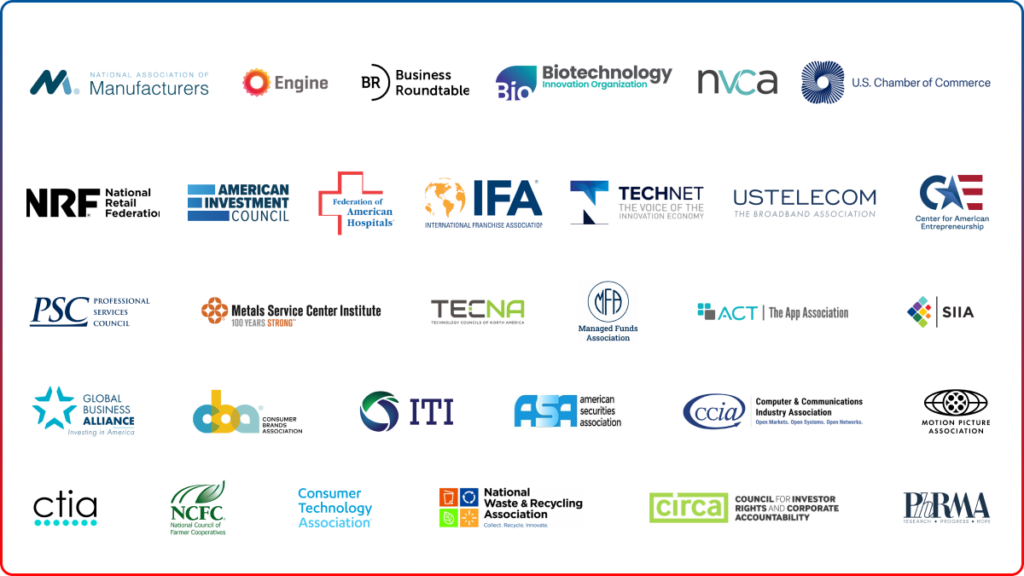AIC & Over 30 Trade Associations Speak Out Against FTC-DOJ Antibusiness Proposal

The American Investment Council recently joined the U.S. Chamber of Commerce, the National Association of Manufacturers, the National Retail Federation, and nearly 30 other influential advocacy organizations representing thousands of businesses across sectors of the U.S. economy to oppose a proposed transformation of the Federal Trade Commission’s (FTC) and Department of Justice’s (DOJ) premerger notification requirements under the Hart-Scott-Rodino Act (HSR Form). The proposed new HSR Form, which Congress did not intend or authorize, will delay and discourage merger and acquisition activity that is vital to businesses of all sizes, stifling the flow of capital, growth, and job creation. The antitrust changes are a result of far-left Sen. Elizabeth Warren, FTC Chair Lina Khan, and DOJ AAG Jonathan Kanter efforts to enact a “comprehensive redesign” of antitrust policy without Congressional approval.
The letter, addressed to leadership of both the Senate and House Judiciary Committees, explains that the proposed changes to the pre-merger notification rules will dramatically delay and discourage private investments and transactions critical to growth, job creation, and innovation for businesses of all sizes. Approximately 85 percent of private equity investments support small businesses with fewer than 500 employees. Economists project that these smaller and middle-market businesses backed by private equity will be hit the hardest by the FTC and DOJ’s significant and unnecessary M&A regulatory burdens.
Copied below are a few key excerpts from the letter:
- Additional $2 Billion Regulatory Burden on Small Businesses – “The FTC’s and DOJ’s new regime would subject thousands of businesses each year to costly and unnecessary new burdens. Smaller and middle-market businesses will be hit the hardest. Economists project the new regime will equate to over $2 billion in annual costs on these businesses with no identifiable benefit.” (Page 1)
- Quadrupling of Average M&A Review Time – “The proposed new regime would … require every company to submit substantial amounts of information in their initial notification, subjecting 100% of transactions to a level of burdensome reporting only potentially necessary for less than 2% of deals. The proposal estimates that the time to prepare an average filing will quadruple. For more complex transactions (which account for nearly half of all merger filings), companies will face a seven-fold increase in filing times. This transformation will delay transactions by weeks or months.” (Page 2)
- No Authorization from Congress – “The proposed rule will impose considerable costs on businesses and inhibit important transactions that introduce no competitive threat of any kind … In short, the FTC and DOJ are attempting to impose significant, unnecessary costs on American businesses that Congress did not intend or authorize.” (Page 2)
At a House Antitrust Subcommittee hearing earlier this week, Ranking Member Rep. Lou Correa (D-CA) and Rep. Scott Fitzgerald (R-WI) highlighted the business community letter and other U.S. industry groups who have expressed concerns with the proposed changes. “I’ve heard significant concerns from a wide variety of businesses with both of these efforts,” said Rep. Correa. “I caution the division that in following its mission to stamp out antitrust violations, it needs to be careful not to unintentionally harm competition and consumers.”

Read an excerpt from Bloomberg covering the letter below:
Business Groups Lobby Congress To Stop Merger Review Changes
Bloomberg | Katie Arcieri
November 14, 2023
View Source
The US Chamber of Commerce and more than two dozen other trade associations are urging members of Congress to help stop an overhaul of the Department of Justice and Federal Trade Commission’s merger and acquisition review process.
The DOJ and FTC’s proposed changes to pre-merger notification rules reject the Hart-Scott-Rodino Act standards companies have relied on for more than four decades and “subject thousands of businesses each year to costly and unnecessary new burdens,” the groups said in a Tuesday letter to Senate Judiciary Committee Chair Dick Durbin (D-Ill.), House Judiciary Committee Chairman Jim Jordan (R-Ohio), Senate Judiciary Committee ranking member Lindsey Graham (R-S.C.) and House Judiciary Committee ranking member Jerrold Nadler (D-N.Y.)
“Smaller and middle-market businesses will be hit the hardest,” the associations wrote, saying they represent thousands of businesses. “Economists project the new regime will equate to over $2 billion in annual costs on these businesses with no identifiable benefit.”


